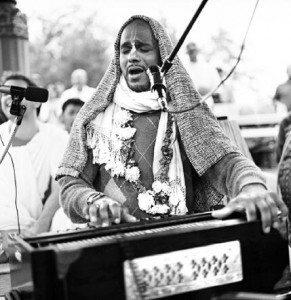
Whole heartedly surrendering to Krishna, as the Bhagavad-gita urges us, is the guaranteed way to become fearless.
I was sitting in the college library one afternoon. Suddenly I saw my friend and classmate Abhishek run frantically into the building. He was breathless and perspiring. In apparent desperation, he approached one of our teachers and asked, “What if I don’t clear my HSC board exam? How will I face my friends and relatives?” The teacher patiently calmed him down, advising him to remain positive instead of getting so agitated by something that had not yet happened.
Abhishek, however, could not settle down. I knew him as a studious young man; he had been a hard-working and conscientious student for as long as I’d known him. But peer and social pressures had somehow taken their toll on him everything in his life seemed to frighten him. Even a mosquito could drive him crazy with fear “What if I get malaria and die?” When the results came out after two months, Abhishek found that he had cleared his exam with distinction.
The uncertainty of the future keeps many of us in a perpetual state of fear. The world is so unpredictable we don’t know what is going to happen next. Health crisis, financial collapse, joblessness, death in the family anything can happen, at any moment. Most of us worry about things that have never happened, and may never happen to us. Fear is like a noose that gets tighter and tighter until it strangles one to death.
Fear and its Consequences
Bhartrhari explains that there are nine types of fear: bhoge roga-bhayam kule cyutibhayam vitte nrpalad bhayam mane dainya-bhayam bale ripubhayam rupe jaraya bhayam sastre vadi-bhayam gune khalabhayam kaye krtantad bhayam sarvam vastu bhayanvitam bhuvi nrnam vairagyam evabhayam [Vairagya-satakam 31]
“In enjoyment there is fear of disease;
In a family there is fear of disgrace;
In wealth there is fear of hostile rulers;
In honor there is fear of humiliation;
In knowledge there is fear of opponents;
In beauty there is fear of old age;
In power there is fear of backbiters;
In virtue there is fear of jealousy;
In body there is fear of death.”
The last one, the fear of death, is the most frightening because what happens after death is a mystery to most. And because we fear it more than anything else, we either ignore or downplay death. Masking it under a thick coating of perfumes and cosmetics, we feel secure in the illusory hope that we are still young and death is too far in the future to be of a present concern. The apparent success of medical science has added to this illusion by falsely increasing the hope that one day we will conquer death completely. Unfortunately, no technological advancement can stop death. The eventuality of death is utterly outside our control. When Srila Prabhupada was once asked why the death rate was so high in India, he replied, “The death rate is the same everywhere 100%.”
It is well known that excessive fear can ruin one’s life. Here are some of its effects:
1.Physical: Gripped by fear, the body reacts adversely: perspiration, palpitation, and a rise in blood pressure.
2.Social: A fearful person feels lonely and isolated and is often unable to mix with friends and society. To maintain his or her status, such a person may resort to speaking lies. Fear also causes us to hate those persons whom we fear. A child afraid of his father hates his father; an employee afraid of his boss hates his boss.
3.Occupational: Over whelmed by fear of failure at work, people often stagnate and stop performing. “If I don’t meet my targets, my boss will fire me.” Such negative emotions completely engulf such people and ruin their lives.
4.Emotional: Fear is compared to a stream of deadly dangerous thoughts. In extreme cases, constant fear can lead to suicide.
The Root Cause

Fear arises when we accept false things as true, the temporary as eternal, illusion as reality. This world of matter is temporary and illusory, and therefore the happiness found here is of the same nature, temporary and illusory. Our body too, being made of matter, has the same nature; it can never provide us everlasting happiness. Forgetting this, we try to find happiness in this material world through the temporary body and we find ourselves in a fearful situation. Fear of change, disruption, and ultimately death looms behind us, not allowing us to remain peaceful. However hard we may try to distract ourselves or to forestall the inevitable with artificial technological facades, the jaws of time continue to devour us until we are face-to-face with inevitable death, suffering from the most heightened state of fear.
Quoting the famous Srimad-Bhagavatam (11.2.37) verse that begins bhayam dviti ya bhini vesatah syat, Srila Prabhupada explains, “Dvitiya refers to matter, which is beyond spirit. Matter is the secondary manifestation of spirit, for matter is produced from spirit. Just as the material elements described are caused by the Supreme Lord, or the Supreme Spirit, the body is also a product of the spirit soul. Therefore, the material body is called dvitiya, or ‘the second.’ One who is absorbed in this second element or second exhibition of the spirit is afraid of death.”
Originally we are spirit souls, different from the material body, and we belong to the eternal, blissful spiritual world. But, for some reason, we have fallen into this world of matter, which is totally foreign to us. Here we have developed a spirit of rebellious independence, averse to the service of God, Krishna. This has put us in a miserable situation. We are now orphans, who have been left alone in the middle of an ocean to fend for ourselves. We now face fear at every step of life, to some degree or the other.
A Guaranteed Remedy
As soon as we understand that we are not this material body, that this material world is not our real home, and that all our possessions, positions, and relationships are temporary, the door of fearlessness flings wide open before us. We must understand that Krishna is the Supreme Personality of Godhead, our loving eternal Father, who is eager to have us back home with Him. All we need to do is sincerely surrender to Him, without reservation. A famous Vaishnava philosopher and poet named Govinda Dasa has sung, bhaja hu re mana sri-nanda-nandana-abhaya-caranaravinda re: “My dear mind, you please worship the son of Nanda [Krishna], who is abhayacarana, whose lotus feet are secure. There is no fear.” To such a devotee who earnestly prays for help, Krishna awards total fearlessness: “Abandon all varieties of religion and just surrender unto Me. I shall deliver you from all sinful reactions. Do not fear.” (Gita 18.66)
As easy as it may sound, surrendering to Krishna is not so easy. To break off the shackles of false faith that happiness can be found in the material world takes practice and time. Within our short lifespan, we need to judiciously utilize, not ludicrously waste, every moment to develop the quality of surrender. If we take one step towards Krishna, He will take thousands of steps towards us. We just need to take the initiative, and Krishna will help us take the next step.
Whatever we achieve in this world does not remain with us forever if not before the final hour, everything we treasure will be taken from us at the time of death. But any effort taken on the spiritual path does not go in vain; those results remain with us permanently, and even the slightest effort protects us from degrading into lower forms of life. Lord Krishna promises that His devotee never perishes. (Gita 9.31)
A Modern Example
The easiest way to become fearless is by studying the lives of great devotees who exemplify the quality of surrender. Srila Prabhupada, at the ripe age of sixty-nine, went to the West to preach the message of Lord Caitanya Mahaprabhu. He had no money or support, no permanent place to stay, no guarantee he would be fed, no source of income. But he was fearless because, as he often said, he had strong faith in the holy name of Krishna and the order of his spiritual master. During the journey he suffered two massive heart attacks; the third one would have killed him. On the night of the second heart attack Srila Prabhupada dreamed he saw Lord Krishna rowing a boat and asking him not to be afraid. The Lord assured Srila Prabhupada that He would be with him. Significantly enough, Srila Prabhupada’s parents had given him the name Abhay Charan, “one who is fearless having taken shelter at Lord Krishna’s feet.” Prabhupada earned that name. Out of compassion, he shared Krishna’s sublime message of the Bhagavad-gita and transformed the lives of millions of people all over the world. He has said, “To award fearlessness to the common man is the greatest act of charity.” At various places in his writings, Srila Prabhupada taught us how to remain fearless. Here are some things we can do to conquer fear:
1. Chanting Krishna’s holy names: Srimad-Bhagavatam (2.1.11) teaches us, “O King, constant chanting of the holy name of the Lord after the ways of the great authorities is the doubtless and fearless way of success for all, including those who are free from all material desires, those who are desirous of all material enjoyment, and also those who are self-satisfied by dint of transcendental knowledge.” Lord Caitanya and Srila Prabhupada have taught us to chant the Hare Krishna maha-mantra.
2. Reading and hearing Srimad-Bhagavatam: The Bhagavatam (1.7.7) says, “Simply by giving aural reception to this Vedic literature, the feeling for loving devotional service to Lord Krishna, the Supreme Personality of Godhead, sprouts up at once to extinguish the fire of lamentation, illusion and fearfulness.” For ISKCON devotees, Srila Prabhupada instituted morning and evening classes in all ISKCON temples to facilitate the study of Srimad-Bhagavatam and the Bhagavad-gita. We should take advantage of this facility as much as possible.
3. Meditation on Krishna’s form: “My dear Lord, O Supreme Personality of Godhead, You are the Supreme Soul. If one meditates upon Your transcendental body, You naturally protect him from all sources of fear, even the imminent danger of death.” (Bhagavatam 7.10.29) We can meditate on the Deity form of Krishna, at home or in the temple. As we advance in spiritual life, Krishna will reveal to us His captivating form fully competent to dispel all fear.
4. Service to devotees: Advanced devotees of the Lord, by dint of their unflinching devotion, acquire godly qualities and always remain fearless. Serving them and following they path they have taken is a guaranteed method of acquiring fearlessness. Srimad-Bhagavatam (6.1.17) confirms this: “The path followed by pure devotees, who are well behaved and fully endowed with the best qualifications, is certainly the most auspicious path in this material world. It is free from fear, and it is authorized by the shastras.”
Among all the methods described above, chanting the holy names is the best and the easiest way to dispel fear, and this is the religion for this age. If we chant sincerely, it can help us instantly transcend all anxieties of this world. Chanting the Hare Krishna maha-mantra Hare Krishna Hare Krishna, Krishna Krishna Hare Hare/ Hare Rama Hare Rama, Rama Rama Hare Hare will swiftly bring us closer to Krishna and make us feel sheltered. By Krishna’s mercy, we will be able to fearlessly march towards our supreme destination, Vaikuntha, the place where there is no anxiety or fear.
Purushottam Kumar is a congregation member of ISKCON Kolkata. He works as a senior executive in Tech Mahindra in Kolkata.
